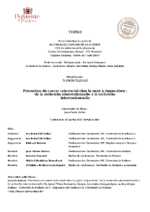Ingrand Isabelle
Prévention du cancer colo-rectal chez le sujet à risque élevé : de la recherche observationnelle à la recherche interventionnelle
frDépôt légal électroniqueConsulter le texte intégral de la thèse (format PDF)

Résumé
Français
Prévention du cancer colo-rectal chez le sujet à risque élevé : de la recherche observationnelle à la recherche interventionnelle
Le but de ce travail est d'élaborer et d'évaluer une intervention de santé publique, visant à augmenter la participation au dépistage ciblé par coloscopie de la population à risque plus élevé de cancer colorectal (CCR) en raison d'antécédents familiaux en faisant appel à une méthodologie qui repose sur 3 étapes successives : 1- une étude observationnelle : l'identification des déterminants associés à la réalisation de la coloscopie chez la fratrie d'un patient atteint de CCR avant 60 ans. (3 publications) 2- une expérimentation contrôlée, visant à tester l'efficacité d'une intervention personnalisée, par une infirmière de prévention, sur la participation au dépistage des fratries d'un patient atteint de CCR ou d'adénome avant 60 ans. L'intervention personnalisée qui a intégré non seulement les fratries mais également les cas index et les médecins a fait la preuve d'une efficacité jusque là jamais atteinte dans les études menées antérieurement aux USA, qui ciblaient uniquement les fratries. Cette analyse épidémiologique a été enrichie par des analyses linguistiques et sociologiques afin de mieux comprendre l'impact de cette intervention téléphonique. (1 publication) 3- Cependant, les contraintes propres à la conduite d’un essai interventionnel randomisé, si elles garantissent un niveau de preuve élevé du bénéfice de l’intervention, ont aussi pour conséquence un caractère expérimental ; cet essai ne pourra être généralisé à l'identique. Une étude de recherche interventionnelle en santé des populations a été soumise à l'appel à projets 2016 de l'INCa.
Mots-clés libres : Cancer colorectal, dépistage ciblé, apparenté au 1er degré, intervention personnalisée.
- Cancer colorectal
English
Prevention of colorectal cancer in high-risk patients: from observational to interventional research
The aim of this work was to develop and evaluate a public health intervention to increase participation in targeted screening colonoscopy for high-risk population of colorectal cancer (CRC) because of family history using a methodology based on three successive stages: 1- an observational study to identify the determinants associated with the achievement of colonoscopy among siblings of a patient with CRC before age 60. (3 publications) 2- a controlled experiment to test the effectiveness of a personalized intervention by a preventive nurse on the participation in screening of siblings of a patient with CRC or adenoma before age 60. The personalized intervention that included not only siblings but also the index case, specialists and general practitioners has demonstrated efficiency never achieved previously in earlier studies in the USA, which targeted only siblings. This epidemiological analysis was enriched by crossed linguistic and sociological analyses to better understand the impact of telephone interventions. (1 publication) 3- However, the constraints on the conduct of a randomized interventional trial, if they guarantee a high level of evidence of the benefit of the intervention, also have the effect of an experimental nature that cannot be generalized. An original research study on population health intervention has been developed and submitted to the 2016 INCa call for projects.
Keywords : Colorectal cancer, targeted screening, first degree relatives, personalized intervention.
Notice
- Diplôme :
- Doctorat d'Université
- Établissement de soutenance :
- Université de Poitiers
- UFR, institut ou école :
- UFR de médecine et de pharmacie
- Laboratoire :
- Centre d’investigation clinique - CIC (Poitiers)
- Domaine de recherche :
- Recherche clinique, innovation thérapeutique, santé publique
- Directeur(s) de thèse :
- Jean-Pierre Richer
- Date de soutenance :
- 06 janvier 2017
- Président du jury :
- Louis-Rachid Salmi
- Rapporteurs :
- Louis-Rachid Salmi, Richard Douard
- Membres du jury :
- Jean-Pierre Richer, Ludovic Gaussot, Michel Morichau-Beauchant, Ghislaine Rolland-Lozachmeur
Menu :
-
-
À propos d'UPthèses
-
Voir aussi
Annexe :
-
Une question ?
Avec le service Ubib.fr, posez votre question par chat à un bibliothécaire dans la fenêtre ci-dessous :
ou par messagerie électronique 7j/7 - 24h/24h, une réponse vous sera adressée sous 48h.
Accédez au formulaire...
Université de Poitiers - 15, rue de l'Hôtel Dieu - 86034 POITIERS Cedex - France - Tél : (33) (0)5 49 45 30 00 - Fax : (33) (0)5 49 45 30 50
these@support.univ-poitiers.fr -
Crédits et mentions légales
